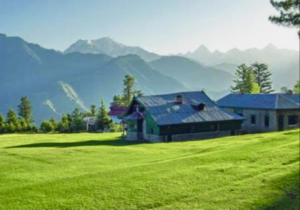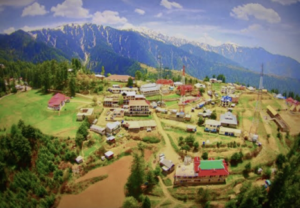Tourism- A Death Knell For Nature?
I enjoy traveling to exotic places and after retirement this has become a major hobby. It is only recently, after decades of visiting these wonderful destinations and savoring what nature has to offer, I have realized that all is not well with planet Earth. Rising population, indiscriminate use of natural resources, extreme commercialization of the tourist industry and the resultant climate change makes it necessary to think about measures needed to preserve nature for the coming generations.
I want to share a personal experience to highlight this damage being done to nature. One of my favorite destinations, Shogran, in the Kaghan Valley in North west of Pakistan, is an area of green meadows and deep pristine forests, situated at a height of 7749 feet. My first visit to this place was in 1965. It was reached by a narrow Jeep-able road, open only during the summer months. The forest was thick, the meadows green, there were glaciers in the valley, human presence was limited to few hikers and campers. The only man-made structure was a Forest Department rest house from where you could occasionally watch a brown bear at the edge of the forest.

Circa 1965
My next visit was in 1985. By then a metal road made access to Shogran easy, the glacier had retreated up the hill. A few kiosks had sprung up around the meadow with encroachments into the forest. An increase in the number of tourists was apparent by the littering around the area.
The present-day situation is alarming. An easy access to the area has greatly increased the influx of tourists. The glacier has disappeared, the brown bears and wildlife visible no more. Unregulated construction of tourist facilities, cutting of forests and general mismanagement of the area has converted a natural paradise into a man-made carnival. The two pictures ( available on Google images on the net ), fifty years apart, very clearly explain the situation.

Circa 2015
Pakistan is not the only country suffering from effects of climate change and destruction of natural environment due to unregulated tourism industry. People worldwide understand the importance of conservation of natural habitats. A new term “ Eco-Tourism “ has gained ground. According to Wikipedia “Ecotourism is catering for holiday makers in the natural environment without damaging it or disturbing habitats. It is a form of tourism involving visiting fragile, pristine, and relatively undisturbed natural areas, intended as a low-impact and often small-scale alternative to standard commercial mass tourism. It means responsible travel to natural areas, conserving the environment, and improving the well-being of the local people”[3]
Many developing nations rely heavily on tourism revenue which also creates the much-needed jobs. However, increasing numbers of visitors and the resultant financial gain, comes at a price. Indiscriminate construction of tourist facilities, increasing burden on the available natural resources and the reduction in traditional space available to indigenous people and wildlife is causing lasting damage to the environment. A pragmatic approach is needed to create a balance between economic needs, development and preservation of nature. Surprisingly the first to adopt the theme of Eco-tourism have been the poorer nations. The industrial world remains the biggest contributor to global warming and climate change.
Examples of responsible tourism can be found in diverse places such as Galápagos Islands in Ecuador, Costa Rica, Patagonia in Chile, Sumatra Indonesia and Rawanda, to name a few. It was probably the realization that the fragile attractions these countries have to offer, would disappear for ever if not treated with care, love and a sense of responsibility.
Pakistan has an immense untapped potential for tourism with its mountains and glaciers, lush green forests, sandy beaches, historical monuments and diverse, colorful cultures. An attempt by the government to tap the tourism potential has had unwanted consequences. The people of Hunza have watched in despair as un-caring tourists overwhelm the available facilities leaving behind mounds of rubbish. Ancient cultural sites are being vandalized and local cultures being tread upon.
A comprehensive policy and strict regulations are needed to benefit from our natural treasures while preserving them for the coming generations. A new awareness, specially in the social media savvy youth of the country, provides a glimmer of hope. Student participation in tree plantation drives, social media campaigns to clean trash from tourist sites, protests and awareness walks for animal rights and climate change have galvanized the general public and brought some awareness of these pressing issues. We need to work wholeheartedly to help preserve nature for our coming generations.
Bibliography
1. Google images. www.tour planner.pk. Online
2. Google images. www.planavoyage.com. Online
3. What is (not) Ecotourism? Global Ecotourism Network (Gen)
www.global ecotourism network.org. 17 August, 2020.
SMAhmed
